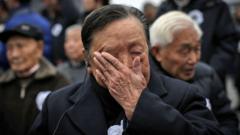How Does a WWII-Era Massacre Still Haunt China-Japan Relations?

Understanding Historical Narratives: The Nanjing Massacre and Its Lasting Impacts
In the realm of historical narratives, few events resonate as profoundly as the Nanjing Massacre. This tragic chapter of history, which unfolded in late 1937, remains a significant and painful topic for many, particularly in the context of Japanese and Chinese relations. The massacre, where estimates suggest over 300,000 civilians and soldiers were killed and around 20,000 women were raped, serves as a stark reminder of the brutality of war. Recently, Japanese vlogger Hayato Kato brought this historical atrocity to the forefront of public discourse, sharing his reflections after watching a film that depicts the horrors of this event. His video, which quickly gained traction on social media, underscores the complexities of memory, denial, and reconciliation in post-war Japan and China.
The Cultural Impact of the Nanjing Massacre
The Nanjing Massacre is not merely a historical event; it has morphed into a cultural touchstone for both China and Japan. Films like "Dead To Rights" or "Nanjing Photo Studio" aim to educate and remind audiences of the past that many perceive as being inadequately acknowledged by Japan. The movie, which has become a box office success, encapsulates the fear, pain, and suffering endured by the Chinese population during the six-week rampage by Japanese troops. Kato's poignant recounting of specific scenes illustrates the emotional weight of these narratives and how they resonate with contemporary audiences. The film's success speaks to a desire for acknowledgment and remembrance, particularly as the world marks significant anniversaries related to World War II.
Historical Memory and Denial
Kato's video also highlights a troubling aspect of historical memory—denial. He noted the prevalence of voices in Japan that assert the Nanjing Massacre did not occur, a sentiment echoed by public figures and even politicians. This denial is alarming, as it risks the repetition of past atrocities. Kato’s call for Japanese citizens to engage with their history is a necessary plea for understanding and growth. Recognizing the dark chapters of one's own past is crucial for healing and preventing future conflicts. The juxtaposition of Kato's video with the comments section, where many responses reflect anger and resentment, illustrates the ongoing struggle over historical narratives and their interpretations.
The Role of Education in Shaping Historical Narratives
Education plays a pivotal role in shaping how societies remember their past. In Japan, the absence of films addressing the anti-Japanese war and the Nanjing Massacre in public discourse suggests a significant gap in education regarding these topics. Kato's observation that these films are not widely viewed in Japan reveals a cultural reluctance to confront uncomfortable truths. Conversely, in China, the narrative surrounding the Nanjing Massacre is deeply embedded in educational curricula, fostering a collective memory that shapes national identity. This divergence in educational focus contributes to the ongoing tension between the two nations and complicates efforts toward reconciliation.
The Legacy of Comfort Women
One of the most painful legacies of Japan's wartime actions is the issue of "comfort women." These women, forced into sexual slavery during the war, continue to seek acknowledgment and reparations. The plight of comfort women is intertwined with the historical memory of the Nanjing Massacre, as both represent the suffering endured by civilians at the hands of the Japanese military. The unresolved nature of this issue adds another layer of complexity to the already fraught relationship between China and Japan. Survivors and their advocates have fought tirelessly for recognition, yet many feel that Japan's apologies have been insufficient, leading to ongoing resentment and anger.
Commemoration and National Identity
The act of commemoration serves as a powerful tool for shaping national identity. In China, the remembrance of the Nanjing Massacre is crucial to the narrative of national victimhood and resilience. The Communist Party has harnessed this narrative to foster a sense of unity and patriotism among the populace. Conversely, Japan's approach to its wartime history is often seen as conflicted and lacking sincerity, particularly regarding the acknowledgment of wartime atrocities. The differing perspectives on historical events exacerbate tensions and complicate diplomatic relations, as each nation grapples with its identity and legacy.
The Impact of Modern-Day Politics on Historical Narratives
In contemporary discourse, the politics of memory are deeply intertwined with national identity and international relations. Under Xi Jinping's leadership, China has emphasized the importance of national rejuvenation, which includes a revisiting of wartime history to foster a sense of patriotism. This political agenda influences how history is taught and commemorated, often emphasizing victimhood while downplaying other aspects of the past. In Japan, the political landscape is similarly complex, with nationalist sentiments sometimes overshadowing acknowledgment of wartime actions. The interplay between political agendas and historical narratives continues to shape the relationship between the two nations, impacting everything from cultural exchanges to diplomatic negotiations.
Public Sentiment and Social Media
Social media platforms have emerged as critical spaces for public sentiment and discourse regarding historical events. Kato’s video, which garnered significant attention, illustrates the potential of social media to facilitate discussions that challenge prevailing narratives. However, the comments section also reveals a divide; while many express support for Kato's message, others respond with hostility or denial. This dichotomy highlights the ongoing struggle over historical memory and the complexities of public sentiment in both countries. Social media serves as both a platform for raising awareness and a battleground for competing narratives, reflecting the broader societal tensions that exist.
Looking Ahead: The Future of Historical Reconciliation
As the 80th anniversary of the end of World War II approaches, the need for historical reconciliation between China and Japan becomes increasingly pressing. Acknowledging the past is essential for fostering mutual understanding and healing. However, entrenched narratives and political agendas complicate this process. The desire for closure on historical grievances is evident, but achieving it requires a willingness from both sides to confront uncomfortable truths. Engaging in open dialogues about history, whether through educational initiatives or cultural exchanges, could lay the groundwork for a more amicable relationship in the future.
FAQs
What was the Nanjing Massacre?
The Nanjing Massacre refers to the mass murder and wartime atrocities committed by Japanese troops against the residents of Nanjing, China, during the Second Sino-Japanese War from December 1937 to January 1938. Estimates of the death toll range from 200,000 to over 300,000 civilians and disarmed soldiers.
Why is the Nanjing Massacre significant in Chinese history?
The Nanjing Massacre is significant because it symbolizes the brutal occupation of China by Japan and serves as a reminder of the suffering endured by the Chinese people during this period. It has become a central narrative in China's collective memory and national identity.
How has Japan addressed its wartime history?
Japan has issued several apologies regarding its wartime actions, but many in China and elsewhere believe these apologies lack sincerity and do not adequately address the scale of the atrocities committed, such as the Nanjing Massacre and the issue of comfort women.
What role does education play in historical narratives?
Education plays a crucial role in shaping how societies understand and remember their past. In Japan, the lack of formal education about the Nanjing Massacre and other wartime atrocities contributes to a culture of denial, while in China, the emphasis on these events fosters a unified national narrative.
Can social media impact historical narratives?
Yes, social media can significantly impact historical narratives by providing platforms for discussion, debate, and the sharing of personal stories. It can both challenge prevailing narratives and amplify different perspectives, reflecting the complexities of public sentiment.
In conclusion, the relationship between history, memory, and identity is a complex and often contentious issue that continues to evolve. As nations grapple with their past, the pursuit of understanding and reconciliation remains essential for fostering peace and collaboration in the future. How can societies learn from their histories to build a more compassionate and understanding world? #NanjingMassacre #JapanChinaRelations #HistoricalMemory
```Published: 2025-08-15 00:28:12 | Category: technology



